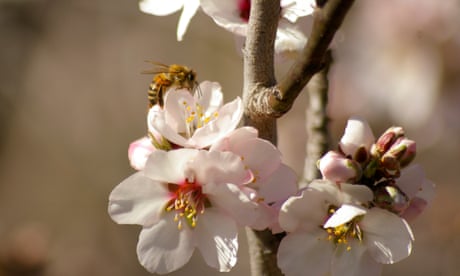- by foxnews
- 08 Apr 2025
Australian almond harvest in jeopardy as ‘Covid for bees’ strikes apiaries
Australian almond harvest in jeopardy as ‘Covid for bees’ strikes apiaries
- by theguardian
- 28 Jun 2022
- in news

The discovery of a deadly parasite being described as "Covid for bees" has had an immediate impact on apiaries, with a ban on movement across New South Wales, but is also likely to affect other agricultural industries, including the upcoming almond blossom season.
Every August, the almond industry requires 300,000 beehives to pollinate the national crop, which represents the largest movement of livestock in the country.
But under the emergency order issued on Sunday after the varroa mite was detected at the Port of Newcastle, no bees are allowed to be moved across NSW, which is home to 44% of the nation's beehives.
"It's a little bit like Covid for bees," Cormac Farrell, the head beekeeper at Australian Parliament House, says.
"We have to stop it at the border to stop it from spreading through the wider landscape and make sure that it can't get out and infect other hives."
Tim Jackson the CEO of the Almond Board of Australia says "the timing of the outbreak could not be worse for the almond industry".
He says the huge number of beehives required for the blossom event already goes close to "maxing out" all available commercial beehives of New South Wales, South Australia, Victoria and southern Queensland and any limitation on bee numbers could have a devastating effect.
Danny Le Feuvre, the acting CEO of the Australian Honeybee Industry Council, says almond pollination accounts for 10% of beekeepers' income. Honeybees also pollinate apples, pears and cherries in September, avocados in October, and seed production later in the year.
"About one in every three mouthfuls of food that you eat has had pollination by honeybees in some shape or form," he says.
Le Feuvre says the rapid rollout of restrictions would hopefully result in a swift containment of the mite and minimise the impact of the outbreak on major agricultural pollination events.
But he says the industry has already started gameplanning ways to allow for the restricted movement of essential bees, if the bee workforce remains locked down when major pollination events - like the looming almond pollination - take place.
The almond board is working with the taskforce in charge of the outbreak to work through all options.
It is difficult for industry to have a definite plan for allowing essential bee movement until they have a clearer idea of the extent of the incursion, Jackson says, but they are hopeful that cold winter conditions will have limited the spread.
"It's a bit early to be panicking, but we're on Code Red as far as concern around how this outbreak will be managed and how we can best pollinate a billion-dollar crop in just over a month," he says.
There are already not enough bees to do the job: Guy Gaeta, the chair of the NSW Farmers horticultural committee, says that if the outbreak reduces honeybee populations that would cause a significant issue for farmers.
Gaeta says the recent spike in almond farms, which require a lot of bees, has caused shortages and price hikes for other agricultural industries.
Gaeta uses 50 hives for a three-week period each year to pollinate his apple and cherry farm outside Orange. He says if his beekeeper is only able to bring 30 it will affect his production.
Varroa mites have slipped past Australia's biosecurity provisions before, notably in Queensland and Victoria, and been successfully contained.
"All efforts have been made to minimise the impact of this incursion while also recognising the very serious threat that it poses," Jackson says.
Australia produces 10% of global almond supply, the second biggest producer behind California which provides 80% of global supply.
"We've gone from being a boutique industry 15 years ago to the richest horticultural export crop in Australia," Jackson says.
Farrell says the winter loss rates of bees (which is the measure of bee survival) in Australia where the varroa mite is not present is below 5%.
Loss rates in the United States are between 30 and 40%. Canada lost up to 90% of its bees over winter in some regions.
"And there are a whole range of factors contributing to this, but the varroa is a really big part of this problem," he said.
Anything above 20% is considered too high by Australian beekeepers, Farrell says.
Farrell's hives in Canberra are not included in the control order, but he is asking all ACT beekeepers to sit tight.
"If we're moving gear around, if we're moving hives around, the chance for an infected hive to slip through the net increases a lot," he says. "So we're just really asking people, even if it's scary, please just sit tight, let [Department of Primary Industries] do their job and figure out where this is."
- by foxnews
- descember 09, 2016
Ancient settlement reveals remains of 1,800-year-old dog, baffling experts: 'Preserved quite well'
Archaeologists have recently unearthed the remarkably well-preserved remains of a dog from ancient Rome, shedding light on the widespread practice of ritual sacrifice in antiquity.
read more


